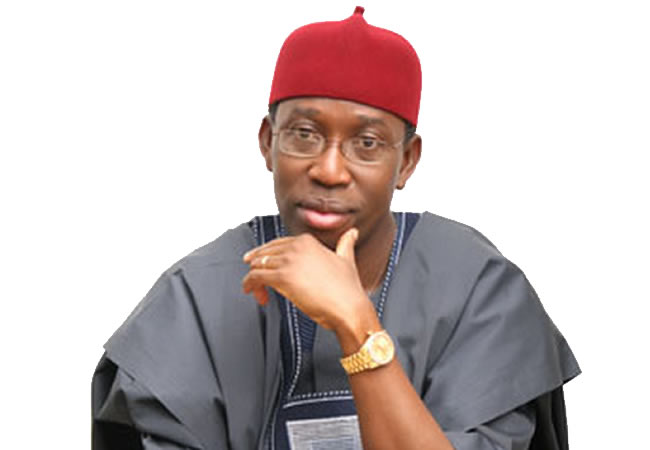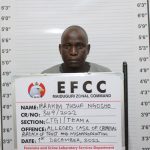...To get all news updates, Join our WhatsApp Group (Click Here)
Also Join our WhatsApp Channel (Click Here)
The Federal High Court sitting in Lagos, in a landmark judgment, has “ordered the disclosure of the spending details of over N200bn public funds collected by the government of former Delta State governor Ifeanyi Okowa from the Universal Basic Education Commission [UBEC] fund and allocations from the Federation Accounts.”
The court ordered the Delta State Governor Sheriff Oborevwori to “disclose details of budgetary allocations and actual spending by the Okowa government between 2015 and 2019, including specific projects carried out to improve primary education in Delta State, and the locations of such projects.”
The judgment was delivered by Honourable Justice Daniel Osiagor, following a Freedom of Information suit number: FHC/L/CS/803/2019, brought by Socio-Economic Rights and Accountability Project (SERAP).
In his judgment, Justice Osiagor held that, “SERAP has cognizable legal right to inquire and know the way and manner public institutions manage public funds. I must say, that every citizen has a duty to demand transparency and accountability in governance of public institutions.”
Justice Osiagor also stated that, “Why should a request for details of disbursement and spending of public funds between 2015-2019 by Delta State be a cause of litigation for four years? Public officials are fast developing a state of anomie and cold feet when confronted with request for audit report of public duties and budgets.”
Justice Osiagor ordered the Delta State government to “disclose how the Okowa government spent over N7.28 billion received from UBEC between 2015 and 2017, and N213 billion received from the Federation Accounts Allocation Committee (FAAC) in 2018, at an average of N17.8 billion monthly.”
SERAP’s suit followed the case of seven year-old Success Adegor, who was sent home because her parents could not pay the illegal school fee/levy of N900, and the poor-quality of her Okotie-Eboh Primary School 1. Miss Success had, in a viral video in March 2019 said, “No be say I no go pay, dem go flog, flog, flog, dem go tire.”
Justice Osiagor ordered the government to “disclose details of the primary schools that have benefited from the projects carried out on access to free and quality primary education in Delta State, and information on indirect costs, including uniforms, exercise books, and transport costs to students and their parents.”
Justice Osiagor also ordered the government to “disclose specific details of the steps Delta State Government is taking to improve the overall welfare of children in primary schools across Delta State, including details of government’s fee-free programme, if any, across primary schools in Delta State.”
Justice Osiagor dismissed all the objections raised by the Delta State government, Universal Basic Education Commission [UBEC] and the Delta State Universal Basic Education Board and upheld SERAP’s arguments. Consequently, the court entered judgment in favour of SERAP against the three respondents.
Justice Osiagor’s judgment, dated 17 July, 2023, read in part: “SERAP’s application cures so much disinformation in the public space. The request by SERAP falls within the categories of records accessible by the public.”
“However, public institutions are becoming increasingly hysterical upon any request served on them for information bordering on accountability.”
“The arguments of the Delta State government and the Delta State Universal Basic Education Board (SUBEB) that the Freedom of Information Act applies to only Federal Government officials cannot be sustained as public institutions are defined in Section 31 of the Interpretation section to include State institutions.”
“Besides, any State Freedom of Information Law that runs contrary to the Federal legislation to the extent of the inconsistency shall be void. See Section 4(5) of the Constitution of Nigeria, 1999 [as amended]. National Assembly’s legislative powers is for the peace, order and good government of Nigeria.”
“The Delta state government’s reliance on the Delta State Freedom of Information Law, 2019 is inappropriate in this case. The retrospective application of the Delta State piece of legislation is hollow as it cannot divest the vested rights of SERAP.”
“The Freedom of Information Act was the only piece of legislation applying to Delta prior to the filing of this suit by SERAP by the doctrine of covering the field. I am not unmindful of the concurrent powers of legislation between the Federal and State legislatures. There is therefore no feature depriving this court of jurisdiction.”
“Besides, the Delta State procedural step is inapplicable as it was not in existence when this cause of action arose. I therefore hold that SERAP has effectively triggered the application of the Freedom of Information Act by their letters of April, 2019 placing demands for information from the Delta State government.”
“The Freedom of Information Act is a liberalized piece of legislation did not place a burden on an Applicant but rather to the contrary places a burden on the public institution/official that the request is forwarded to. See Section 1[2] of the Act which provides: ‘an applicant under this Act needs not demonstrate any specific interest.”
“The piece of legislation therefore clothed SERAP with the firm ground to apply and demand the Delta State government to within 7 days respond to the request. For all I have been postulating herein, I find merit in the application by SERAP and grant all the reliefs as sought.”
“The Delta State government and the Delta State Universal Basic Education Board neither responded to the letters by SERAP nor complied with the demands, hence this action for mandamus to compel them under the Freedom of Information Act.”
“SERAP’s action therefore, puts the provisions of the Freedom of Information Act to a litmus test regarding the right of an NGO to seek and obtain information from the public archives or records.”
“The Freedom of Information Act should be commendable in this Democratic dispensation as its implementation becomes a derivative action underpinning Section 39 of the Constitution of Nigeria, 1999 [as amended] of the freedom of expression and holding opinions.”
“In the letter dated 29 July 2023 sent to Governor Sheriff Oborevwori on the judgment, and signed by SERAP deputy director, Kolawole Oluwadare, the organization said, “We note your stated commitment in your inaugural speech ‘to deliver good governance to our people.’ We therefore urge you to immediately obey and respect the judgment of the Court.”
SERAP’s letter, read in part: “We urge you to invite the former State governor Ifeanyi Okowa and to direct the Delta State Universal Basic Education Board to explain the spending of the education funds and to immediately compile and disclose the spending details of the funds as ordered by the court.”
“By immediately complying with the judgment, your government will be sending a powerful message to politicians and others that they will be held to account even when out of office.”
Mr Okowa was the vice presidential candidate of the Peoples Democratic Party (PDP) in the 2023 general elections. Joined as defendants in the suit are the Universal Basic Education Commission [UBEC] and the Delta State Universal Basic Education Board (SUBEB).
Justice Osiagor granted the following orders of mandamus:
AN ORDER OF MANDAMUS is hereby made directing and compelling the Delta State Governor and Delta State government to provide SERAP with the following information:
[a] Details of budgetary allocations and actual spending by Delta State Government between 2015 and 2019, including specific projects carried out to improve access to free and quality primary education in Delta State, the locations of such projects and the primary schools that have benefited from the projects.
[b] Specific details of the steps Delta State Government is taking to improve the overall welfare of children in primary schools across Delta State.
[c] Details of Delta State Government’s fee-free programme, if any, across primary schools in the Delta State and information on indirect costs, including uniforms, exercise books, and transport costs to students and their parents.
[d] Details of specific projects by Delta State Government to improve access to education for children with disabilities.
AN ORDER OF MANDAMUS is hereby made directing and compelling the Universal Basic Education Commission [UBEC] to provide SERAP with the following information:
[a] Details of disbursement and administration of Universal Basic Education Commission (UBEC) funds disbursed through the Delta State Universal Basic Education Board to the Delta State Government.
[b] Details of reports, if any, made to UBEC by the Delta State Government on specific projects carried out to ensure improvement of access to free and quality primary education in Delta State between 2015 and 2019, the locations of such projects and the primary schools that have benefited from the projects.
[c] Details of Delta State’s fee-free programme, if any, across primary schools in the state and information on indirect costs, including uniforms, exercise books, and transport costs to students and their parents.
[d] Details of specific projects by the Board to ensure improvement of access to education for children with disabilities.
You can get every of our news as soon as they drop on WhatsApp ...To get all news updates, Join our WhatsApp Group (Click Here)
Also Join our WhatsApp Channel (Click Here)

















